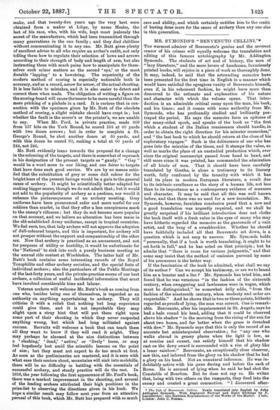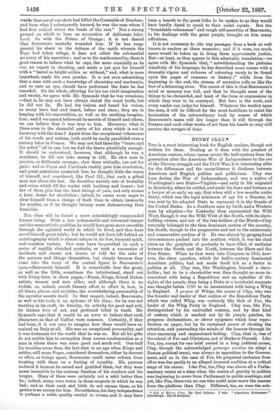MR. SYMONDS'S " BENVENUTO CELLINI."*
THE warmest admirer of Benvennto's genius and the severest censor of his crimes will equally welcome the translation and editing of this famous autobiography by Mr. Addington Symonds. The students of art and of history, the men of "lazy literature," and the mere lovers of handsome, 'uxoriously printed books, will rejoice in a piece of work so thoroughly done. It may, indeed, be said that the astounding memoirs have been presented for the first time in English in a manner which would have satisfied the egregious vanity of Benvenuto himself, even if, in his vehement fashion, he might have more than demurred to the estimate and explanation of his nature and character with which the volume opens. That intro-
duction. is an admirable critical essay upon the man, his book, and his times ; and it comes with some authority from Mr.
Symonds, who has profoundly studied and brilliantly por- trayed the period. He says the memoirs form an epitome of the many-sided epoch, and speaks of the book as " the first which a student of the Italian renaissance should handle, in order to obtain the right direction for his minnter researches," and " the last book to which he should return at the close of his exploratory voyages." Such is the deliverance of one who has gone into the minutim of the times, and it stamps the value, as well as marks the place of an unstudied production which, ever since the original manuscript passed from hand to hand, and still more since it was printed, has commanded the admiration of all kinds of men. That it should have been carefully translated by Goethe, is alone a testimony to its literary worth, fully confirmed by the tenacity with which it has held its place in modern European literature, a result due to its intrinsic excellence as the story of a human life, not less than to its importance as a contemporary evidence of manners and character. It may be said that all this was well known before, and that there was no need for a new translation. Mr. Symonds, however, furnishes conclusive proof that a new and a good translation was urgently required, and we shall be greatly surprised if his brilliant introduction does not clothe the book itself with a fresh value in the eyes of many who may have hitherto regarded the memoirs as the gasconade of a vain artist, and the brag of a swashbuckler. Whether he should have faithfully included all that Benvenuto set down, is a question which is not easy to answer. Mr. Symonds holds " personally, that if a book is worth translating, it ought to be set forth in full," and he has acted on that principle ; but he admits that "there is room for various judgments," and that some may insist that the method of omission pursued by some of his precursors is the better way.
If the fascination of the book be admitted, what shall we say of its author P Can we accept his testimony, or are we to brand him as a boaster and a liar ? Mr. Symonds has tried him, and found that he was veracious "in the fashion of the sixteenth century, when swaggering and lawlesneas were in vogue, which must be distinguished," he somewhat drily adds, " from the fashion of the nineteenth century, when modesty and order are respectable." And he shows that in two or three points, hitherto regarded as proofs of lying, the man was correct. One is remark- able. Benvenuto, after his imprisonment in St. Angelo, says he had a halo round his head, adding that it could be observed above his shadow " in the morning from the rising of the sun for about two hours, and far better when the grass is drenched with dew." Mr. Symonds says that this is only the record of an accurate but misinterpreted observation ; for "any one who walks abroad in grassy places when the light is low, as at sunrise and sunset, can satisfy himself that his shadow cast on the dewy award is surrounded with a rim of glory like a lunar rainbow." Benvennto, an exceptionally close observer, saw this, and inferred from the glory on his shadow that be had a glory on his head. Not an unnatural inference. He was in- dubitably active with his guns during and before the sack of Rome. He is accused of lying when he said he had shot the Constable of Bourbon. But he does not say so. He writes that, being with two others on the ramparts, they fired into the enemy and created a great commotion. "I discovered after-
• The Life of Benroenuto Cellini. Newly tranalated into English by John Addington Symonds. With Engraved Portrait and Right Etchings by F. lagoillermie ; also Eialateen Reproductions of the Works of the blaster. 2 vole. London ; John 0. Nkomo. wards that one of our shots had killed the Constable of Bourbon; and from what I subsequently learned, he was the man whom I had first noticed above the heads of the rest." Not a strong ground on which to base an accusation of deliberate false- hood. So with the Prince of Orange ; it is not denied that Benvenuto mortally wounded him. If he has exag- gerated his share in the defence of the castle wherein the Pope had taken refuge, it does not affect the substantial accuracy of his narrative; and as to his marksmanship, there is good reason to believe what he says, the more especially as he was an expert in shooting, and made a pet gun for himself with a "barrel as bright within as without," and, what is more important, made his own powder. It is not even astonishing that a man with such a knowledge of chemistry and mechanics, and so sure an eye, should have performed the feats he has recorded. On the whole, allowing for his too vivid imagination and vanity, we agree with Mr. Symonds that he was veracious, —that is, he may not have always stated the exact truth, but he did not lie. He had his visions and heard hie voices, as many have had and heard, before and since ; they are in keeping with his superstition, as well as his seething imagina- tion ; and if we cannot believe all he asserts of himself and others, we can believe that it was true to him. Moreover, what is there even in the shameful parts of his story which is not in harmony with the time ? Apart from the exceptional vehemence of his words and actions, both could be easily paralleled even a century later in France. We may not find there the "bravo and the artist" all in one, but we find the bravo plentifully enough. It should be understood, however, that although he was a murderer, he did not take money to kill. He Blew men in passion, or deliberate revenge; slew them wickedly, but not for gain; and as Popes and Cardinals readily gave him absolution, and great potentates protected him, he thought little the worse of himself, and considered, like Paul III., that such a gifted man was above the law. He describes naively acts of brutality and crime which fill the reader with loathing and horror ; but few of them give him the least twinge of pain, and only arouse a keen desire for absolution ; indeed, he seems more eager to clear himself from a charge of theft than to obtain immunity for murder, as if he thought larceny more dishonouring than homicide.
Not often will be found a more astonishingly compounded human being. With a less inflammable and vehement temper and the same artistic qualities, he would have gone more smoothly through the agitated world in which he lived, and thus have saved himself great trials ; but he would not have left behind an autobiography which is almost unique in its flow, buoyant spirit, and ceaseless variety. Few men have bequeathed us such a series of rapidly sketched portraits, or such a succession of incidents and events not drawn or told for the sake of the persons and things themselves, but simply because they come into the story of the central figure in Benvenuto's eyes,—Benvenuto himself. It is remarkable how the great, as well as the little, sometimes the infinitesimal, stand out with living force in these pages,—Popes, Kings, Grand Dukes, artists, women and men alike ; and although there is no visible, or, indeed, occult literary effort to effect it, how, in all times, places, and societies, the overwhelming personality of the narrator asserts itself. In that respect, indeed, Benvennto, as well as his book, is an epitome of his time; for he was not wanting in its craft, its ferocity, its activity for good and evil, its intense love of art, and profound belief in itself. Mr. Symonds says that it would be an error to believe that such characters as that of Cellini were common. Certainly, if they bad been, it is not easy to imagine how there would have re- mained an Italy at all. His was an exceptional personality, and it was fortunate for the world that he was so. But all his gifts do not entitle him to exemption from severe condemnation as a man in whom there was some good and much evil. One-half his troubles arose from the fact that in an age when Kings and nobles, still more Popes, considered themselves, either by descent or office, as beings apart, Benvenuto could never refrain from treating with them on a footing of equality. His patrons endured it because he served and gratified them, but they were never insensible to the extreme freedom of his conduct and his tongue. Many of them were certainly not a whit better than he; indeed, many were worse in those respects in which he was bad ; and as their rank and birth do not excuse them, so his genius is no excuse for him. Nevertheless, his fiery independence as perhaps a noble quality carried to excess, and it may have
been a benefit to the great folks to be spoken to as they would have hardly dared to speak to their social equals. But the "formidable vehemence" and rough self-assertion of Benvennto, in his dealings with the great people, brought on him many afflictions.
It is not necessary to cite any passages from a book so well known to readers as these memoirs; and if it were, too much space would be taken up in doing them approximate justice. But—at least, as they appear in this admirable translation—we agree with Mr. Symonds that, " notwithstanding the plebeian simplicity of his language, he has described some scenes with a dramatic vigour and richness of colouring rarely to be found upon the pages of romance or history;" while from the beginning to the end, the stream of narrative rolls on like the flow of a brimming river. The secret of this is that Benvenuto's mind or memory was full, and that he thought most of the things to be chronicled, and least of the form or expressions in which they were to be conveyed. But here is the work, and every reader can judge for himself. Whatever the verdict upon the man, it will be difficult for the most fastidious to resist the fascination of the extraordinary book by means of which Benvenuto's name will live longer than it will through the Perseus and such other works of art from his hands as may still survive the ravages of time.







































 Previous page
Previous page